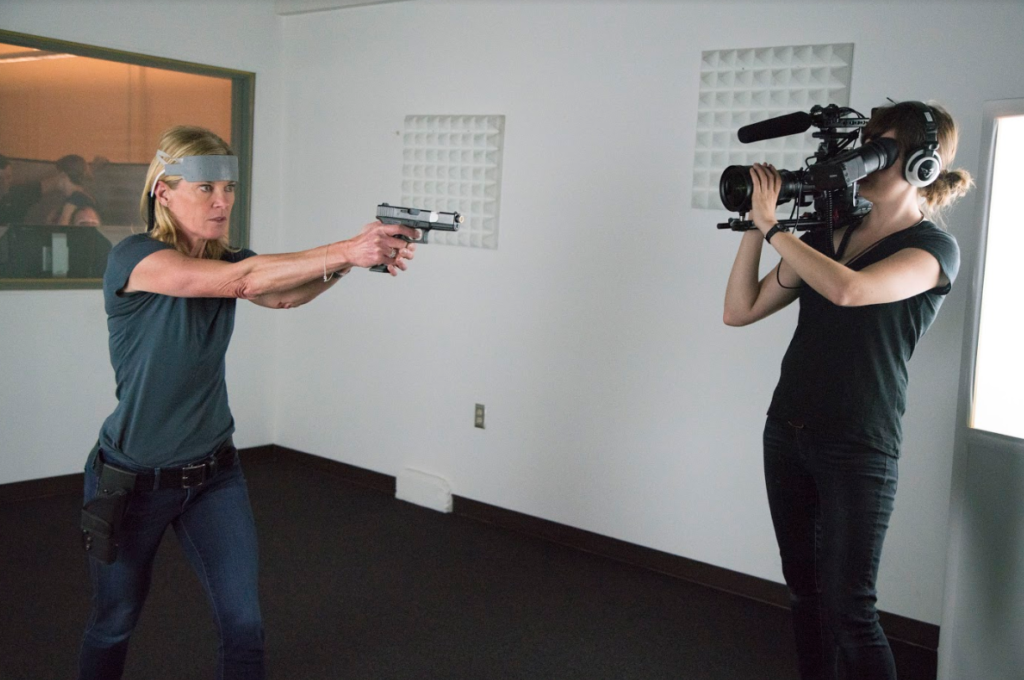Robin Hauser is an award-winning director of documentary films at Finish Line Features. Her exploration into implicit gender and racial bias in artificial intelligence led her to introduce the subject to the TED stage in December 2017. She also presented at TEDx in 2019 on “The Likability Dilemma for Women Leaders.” Hauser’s previous film, “CODE: Debugging the Gender Gap,” premiered at Tribeca Film Festival in 2015, screened at The White House, and caught the attention of the international tech industry and of policy makers and educators around the world. Hauser is a diplomat for the American Film Showcase and speaks about unconscious bias, the importance of diversity and inclusion, and on behalf of women’s rights at U.S. Embassies, conferences, and corporate headquarters worldwide.
“Bias” is now available on Digital and On Demand.
W&H: Describe the film for us in your own words.
RH: “Bias” is a feature documentary which follows my journey to uncover my hidden biases and explore how unconscious bias affects our relationships, workplaces, technology, and the justice system.
W&H: What drew you to this story?
RH: After making the film “CODE: Debugging the Gender Gap,” which is about the lack of diversity in tech, I began to contemplate the role that bias plays in sexism, racism, and all of the other “isms” that plague our society.
Then I became fascinated by the fact that, as humans, we are inherently biased — that bias is a survival heuristic which lives deep within all of us. And yet in modern society we strive to accept and embrace diversity. I wanted to learn more about unconscious bias and how it affects us socially and in the workplace.
W&H: What do you want people to think about after they watch the film?
RH: I hope the film invites viewers to become curious about getting to know their biases. When we become aware of our biases, we can work with them instead of letting subtle prejudices unconsciously direct our decisions.
W&H: What was the biggest challenge in making the film?
RH: Exposing my biases on the big screen wasn’t easy. I had to be willing to be completely transparent and vulnerable and I wasn’t sure how the audience would respond.
Ultimately, I had to let go of any concern about what people would think about me, and trust that being transparent and authentic would ultimately disarm the audience and enable them to look inward.
W&H: How did you get your film funded? Share some insights into how you got the film made.
RH: The majority of the funding for “Bias” came from corporate sponsors and private foundations. All funding is received as donations to Unleashed Productions, my 501(c)3 company, and no contributor — individual or corporate — has any creative control of the film.
I am enormously grateful to the companies and foundations who believe in the power of documentary films and supported the project.
W&H: What inspired you to become a filmmaker?
RH: Photography has been a passion since I was a teenager. I’m inspired by the impact visual storytelling has on an audience, and so in that way, shooting films felt like a natural next step. All I needed was a story that needed to be told.
I found that story when I dove into my first film, “Running for Jim,” about a much-loved high school running coach who was diagnosed with ALS. The rest of the story you can learn by watching the film!
W&H: What’s the best and worst advice you’ve received?
RH: The best advice I received about filmmaking was to not judge the success of a film on film festival acceptances. A film should be judged by the impact it has on its audience. As filmmakers, it can be easy to draw comparisons based on laurels and prestige, but that’s not what the art is about.
The worst advice I received was to “not waste my time looking to corporate America for funding.” I’m glad I didn’t follow that advice, as my persistence in being creative about funding has paid off both in freedom and in access to audiences who may not have seen the film otherwise. It’s been helpful to be in touch with the demographics that connect with my work — and many companies appreciate the invitation to support content they believe in.
W&H: What advice do you have for other female directors?
RH: My advice for a director of any gender — I don’t believe gender has anything to do with directing — is to believe in their story wholeheartedly and to be your version of awesome. Own your unique gifts and be persistent. Listen and be compassionate. But at the end of the day, don’t be afraid to do your thing and let the film speak for itself.
W&H: Name your favorite woman-directed film and why.
RH: My favorite film is “Born into Brothels,” directed by Zana Briski. Zana’s story illustrates the true essence of emergent documentary storytelling, as she adapted from the film she originally set out to tell — about sex workers in Calcutta — to a story about the children born in the brothels. It’s both visually and emotionally captivating.
W&H: How are you adjusting to life during the COVID-19 pandemic? Are you keeping creative, and if so, how?
RH: Last Friday I filmed my first Zoom interview with a subject for my newest project, “$avvy,” a documentary.
It’s definitely new territory. While I greatly prefer to interview my subjects face-to-face, this web-based interview was a way to stay active and keep the project moving.
As the film is about our relationship with money, the changing economic landscape of COVID-19 is adding nuance to the film’s narrative. I’m embracing that Zoom interviews are a part of this cultural moment, while wishing laptops had better built-in cameras!







